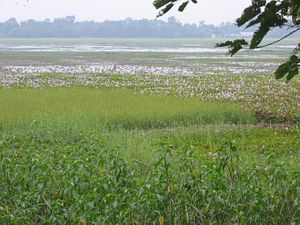Assam’s fragile peace could be unraveling as its ethnic fault lines resurfaced again last week, claiming over thirty lives within the Muslim community. According to unconfirmed reports, over fifty people are still missing. The attack came just a week after parliamentary elections were held in the region, on April 24. The violence was attributed to the large-scale polarization of voters along ethnic and religious lines .
The incident took place in Bodoland, a northern area of Assam where the Bodo tribes lives. The Bodo are an indigenous people and one of the oldest tribes within the state. Over the years, the area also came to be occupied by non-Bodo communities from different parts of the country and even Bangladesh. Many Bangladeshis immigrated there both before and after the partition in 1947.
Eventually, the demographic marginalization of Bodos led to rebellion and violence against non-Bodo settlers and the demand for a separate state in the 1980s and 1990s. The insurgency under the aegis of the Bodo Liberation Tigers (BLT) culminated in the Bodo accord in 2003 that gave the indigenous ethnic group the Bodo Territorial Council (BTC) — an autonomous political body comprising four districts,where they can exercise exclusive control, thereby denying other communities any stake in the governance of Bodoland.
This led to resentment among non-Bodo groups. The Bodo constitute only 26 percent of the population of the area but exercise full political control. A majority of settlers in the Bodoland are Muslims but they are not illegal migrants; they have settled in the area over many decades and have become part of the area. The BTC has recognized the political aspirations of the indigenous tribe while ignoring the interests of the non-tribal population who comprise 74 percent of the population.
These grievances led non-Bodo groups to consolidate and vote against the Bodo candidate who has been winning elections for over a decade. An Indian Express editorial notes that “in a region with a long history of ethnic strife and crisscrossed by competing ethnic demands, a polarizing election has brought dormant tensions to life again.”
“This is not a new problem it is rooted in the history of Assam.This is basically a fight between old and new settlers,” says Dipanjan Roy Choudhary, a journalist with the Economic Times.
But he finds it strange that the violence took place after the elections which will not benefit any political group in Assam. “Perhaps this is an attempt to polarize voters at the pan-India level,” says Choudhary.
Without mincing words, Abdul Kalam Azad of the Tata Institute of Social Sciences, Guwahati, says that “Narendra Modi’s (the prime ministerial candidate of Bharatiya Janata Party) anti-immigrant pitch against Bangaldeshi Muslims has aggravated the situation.” He further says that “Bodo groups are getting support from the BJP.”
In recent political speeches in West Bengal, Modi has come down hard on illegal Bangladeshi immigrants and promised to throw them back once he comes to power. He however welcomed Hindu migrants from the neighborhood.
This has polarized opinions in the country at a time when elections are in the final stages and voting is taking place in the areas where there is a significant Muslim population.
This is the reason why Chief Minister Omar Abdullah of Jammu and Kashmir blamed Modi for the violence in Assam and other places.
A senior political analyst on the condition of anonymity notes that Modi’s rhetoric has given anti-India forces in the region the opportunity to foment communal troubles in the country. The Indian Express writes that “fears about Muslim migration from Bangladesh, notions of a Muslim ‘infestation’ spreading across the Bodo homeland, abound and have been happily encouraged by certain political parties.”
The rhetoric of the Hindu right-wing leader has aggravated the communal situation in neighboring Bangladesh as well. Reports coming from Dhaka say that a mob of 3,000 youth attacked Hindu temples and households in the Comilla district of eastern Bangladesh.
The hard line communal rhetoric of the Hindu right-wing leader might help him win elections but it will end up creating tensions in a pluralistic society. Therefore, the violence in Assam is not a local issue; it has wider implications not only for the country but the whole region.

































